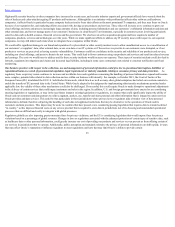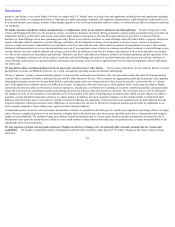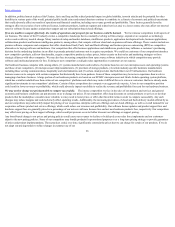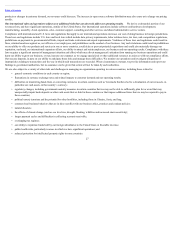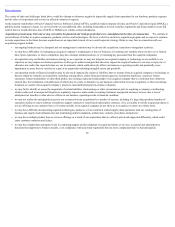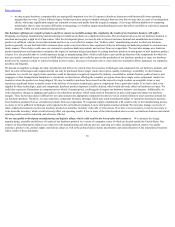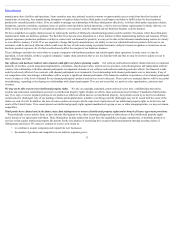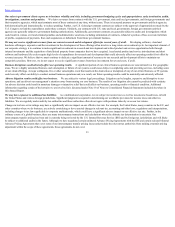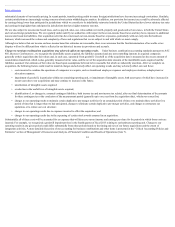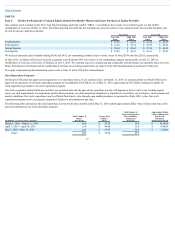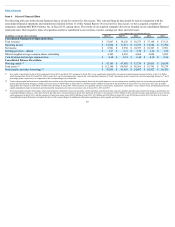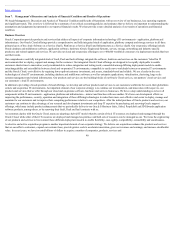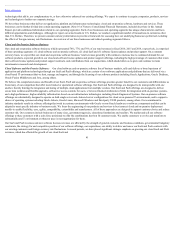Oracle 2015 Annual Report Download - page 35
Download and view the complete annual report
Please find page 35 of the 2015 Oracle annual report below. You can navigate through the pages in the report by either clicking on the pages listed below, or by using the keyword search tool below to find specific information within the annual report.
Table of Contents
Our sales to government clients expose us to business volatility and risks, including government budgeting cycles and appropriations, early termination, audits,
investigations, sanctions and penalties. We derive revenues from contracts with the U.S. government, state and local governments, and foreign governments and
their respective agencies, which may terminate most of these contracts at any time, without cause. There is increased pressure on governments and their agencies,
both domestically and internationally, to reduce spending. Further, our U.S. federal government contracts are subject to the approval of appropriations made by the
U.S. Congress to fund the expenditures under these contracts. Similarly, our contracts with U.S. state and local governments, foreign governments and their
agencies are generally subject to government funding authorizations. Additionally, government contracts are generally subject to audits and investigations which
could result in various civil and criminal penalties and administrative sanctions, including termination of contracts, refund of a portion of fees received, forfeiture
of profits, suspension of payments, fines and suspensions or debarment from future government business.
We may not receive significant revenues from our current research and development efforts for several years, if at all. Developing software, cloud and
hardware offerings is expensive and the investment in the development of these offerings often involves a long return on investment cycle. An important element of
our corporate strategy is to continue to make significant investments in research and development and related product and service opportunities both through
internal investments and the acquisition of intellectual property from companies that we have acquired. Accelerated product and service introductions and short
software and hardware life cycles require high levels of expenditures for research and development that could adversely affect our operating results if not offset by
revenue increases. We believe that we must continue to dedicate a significant amount of resources to our research and development efforts to maintain our
competitive position. However, we do not expect to receive significant revenues from these investments for several years, if at all.
Business disruptions could adversely affect our operating results. A significant portion of our critical business operations are concentrated in a few geographic
areas. We are a highly automated business and a disruption or failure of our systems could cause delays in completing sales and providing services, including some
of our cloud offerings. A major earthquake, fire or other catastrophic event that results in the destruction or disruption of any of our critical business or IT systems
could severely affect our ability to conduct normal business operations and, as a result, our future operating results could be materially and adversely affected.
Adverse litigation results could affect our business. We are subject to various legal proceedings. Litigation can be lengthy, expensive and disruptive to our
operations, and can divert our management’s attention away from running our core business. The results of our litigation also cannot be predicted with certainty.
An adverse decision could result in monetary damages or injunctive relief that could affect our business, operating results or financial condition. Additional
information regarding certain of the lawsuits we are involved in is discussed under Note 18 of Notes to Consolidated Financial Statements included elsewhere in
this Annual Report.
We may have exposure to additional tax liabilities. As a multinational corporation, we are subject to income taxes as well as non-income based taxes, in both
the United States and various foreign jurisdictions. Significant judgment is required in determining our worldwide provision for income taxes and other tax
liabilities. We are regularly under audit by tax authorities and those authorities often do not agree with positions taken by us on our tax returns.
Changes in tax laws or tax rulings may have a significantly adverse impact on our effective tax rate. For example, the United States, many countries in the EU, and
other countries where we do business, are actively considering or have enacted changes in relevant tax, accounting and other laws, regulations and interpretations,
including changes to tax laws applicable to corporate multinationals, which could have a significant adverse impact on our effective tax rate. Further, in the
ordinary course of a global business, there are many intercompany transactions and calculations where the ultimate tax determination is uncertain. Our
intercompany transfer pricing has been and is currently being reviewed by the U.S. Internal Revenue Service (IRS) and by foreign tax jurisdictions and will likely
be subject to additional audits in the future. Although we have negotiated certain unilateral Advance Pricing Agreements with the IRS and certain selected bilateral
Advance Pricing Agreements that cover some of our intercompany transfer pricing issues and preclude the relevant tax authorities from making a transfer pricing
adjustment within the scope of these agreements, these agreements do not cover
33


